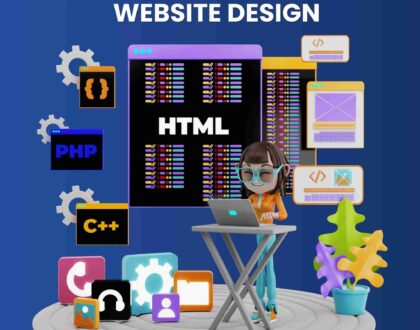Choosing the Right CMS for Custom Website Design
CMS for Custom Website Design – In the digital age, having a strong online presence is crucial for businesses of all sizes. A well-designed website serves as the digital storefront, showcasing products, services, and brand identity to potential customers across the globe. However, creating a custom website requires careful consideration of various factors, one of the most critical being the choice of Content Management System (CMS).
Choosing the Right CMS for Custom Website Design: A Comprehensive Guide
A CMS is the backbone of any website, providing the tools and functionalities necessary for content creation, management, and publication. With a myriad of options available in the market, selecting the right CMS for your custom website design can be a daunting task. In this comprehensive guide, we’ll delve deep into the world of CMS platforms, exploring their features, benefits, and suitability for custom website design.
A. Understanding Custom Website Design
Before diving into the specifics of CMS platforms, it’s essential to understand what custom website design entails. Unlike template-based designs, custom websites are built from scratch, tailored to meet the unique requirements and preferences of the business or individual. Custom design offers unparalleled flexibility, allowing for the creation of a truly distinctive and user-centric web experience.
Custom website design involves:
- Unique Visual Identity: Custom designs enable businesses to establish a strong brand identity through bespoke visuals, including logos, color schemes, typography, and imagery.
- Tailored Functionality: Custom websites can incorporate specific functionalities and features tailored to the business’s needs, such as e-commerce capabilities, interactive elements, and third-party integrations.
- Optimized User Experience: By designing with the end user in mind, custom websites prioritize usability, accessibility, and intuitive navigation, enhancing the overall user experience.
- Scalability and Future-Proofing: Custom websites are inherently scalable, allowing for seamless expansion and adaptation as the business grows and evolves. They are also less reliant on third-party templates, reducing the risk of obsolescence.
B. Importance of Choosing the Right CMS
While custom website design offers unparalleled freedom and flexibility, the choice of CMS plays a crucial role in realizing the design vision and ensuring efficient management and maintenance of the website. The right CMS should align with the unique requirements of the project, offering a balance of features, scalability, ease of use, and compatibility with the desired design aesthetics.
Key considerations when selecting a CMS for custom website design include:
Flexibility and Customization:
- The CMS should provide robust customization options, allowing developers to implement unique design elements and functionalities without limitations imposed by pre-built templates.
Content Management Capabilities:
- An intuitive content management interface is essential for efficient content creation, editing, and publishing. The CMS should support various content types, including text, images, videos, and interactive media.
Scalability and Performance:
- As the website grows in content and traffic, the CMS should be capable of handling increased load and maintaining optimal performance without compromising speed or reliability.
SEO-Friendliness:
- Search engine optimization (SEO) is paramount for driving organic traffic to the website. The CMS should support SEO best practices, including customizable metadata, clean URL structures, mobile responsiveness, and fast loading times.
Security Features:
- Protecting sensitive data and preventing unauthorized access is paramount for the security of the website and its visitors. The CMS should offer robust security features, regular updates, and proactive measures against vulnerabilities and malware.
Third-Party Integrations:
- Seamless integration with third-party tools and services enhances the website’s functionality and extends its capabilities. The CMS should support a wide range of integrations, including e-commerce platforms, analytics tools, marketing automation, and social media plugins.
Community Support and Documentation:
- A vibrant community of developers and users, along with comprehensive documentation and support resources, can be invaluable for troubleshooting issues, accessing tutorials, and staying updated on the latest developments and best practices.
With these considerations in mind, let’s explore some of the top CMS platforms renowned for their suitability for custom website design.
C. WordPress: The Powerhouse of Customization
WordPress is undoubtedly one of the most popular CMS platforms globally, powering millions of websites across diverse industries. While often associated with blogging, WordPress has evolved into a versatile platform capable of supporting complex custom website designs with ease.
Features:
Flexible and Extensible:
- WordPress’s extensive library of themes and plugins provides unparalleled flexibility, enabling developers to create highly customized websites tailored to specific requirements.
User-Friendly Interface:
- With its intuitive dashboard and WYSIWYG editor, WordPress is beginner-friendly, allowing users to manage content, customize layouts, and implement design changes without coding knowledge.
Scalability:
- WordPress’s modular architecture and robust ecosystem make it highly scalable, capable of supporting websites of all sizes, from small blogs to enterprise-level e-commerce platforms.
SEO Optimization:
- WordPress offers built-in SEO features, including customizable permalinks, XML sitemap generation, and plugins like Yoast SEO, facilitating better visibility and ranking on search engine results pages (SERPs).
Community Support:
- With a vast community of developers, designers, and users, WordPress boasts extensive documentation, forums, and online resources, making it easy to find solutions to technical challenges and stay updated on best practices.
Considerations:
- Security: While WordPress itself is secure, the platform’s popularity makes it a target for hackers. Regular updates, strong passwords, and security plugins are essential for mitigating security risks.
- Performance Optimization: To ensure optimal performance, developers may need to implement caching, content delivery networks (CDNs), and other optimization techniques, especially for high-traffic websites.
- Customization Complexity: While WordPress offers extensive customization options, complex designs may require advanced coding skills and may be limited by the capabilities of certain themes and plugins.
Overall, WordPress remains a top choice for custom website design, offering a perfect balance of flexibility, scalability, and user-friendliness.
D. Drupal: The Enterprise Solution
Drupal is a powerful open-source CMS renowned for its robustness, scalability, and flexibility, making it an ideal choice for large-scale custom website projects, particularly in the enterprise sector.
Features:
- Advanced Customization: Drupal’s modular architecture and robust API enable developers to create highly customized websites with complex data structures, workflows, and integrations.
- Scalability and Performance: Designed for scalability, Drupal can handle large volumes of content and traffic without compromising performance, making it suitable for enterprise-level websites and applications.
- Security: Drupal has a strong focus on security, with regular security updates, built-in user access controls, and robust authentication mechanisms, making it a trusted choice for organizations with stringent security requirements.
- Multilingual Support: Drupal offers built-in multilingual capabilities, allowing websites to serve content in multiple languages, making it an ideal choice for global businesses and multilingual audiences.
- SEO-Friendly: Drupal provides SEO-friendly features, including clean URL structures, customizable metadata, and support for schema.org markup, helping websites achieve better visibility and ranking on search engines.
Considerations:
- Learning Curve: Drupal has a steeper learning curve compared to other CMS platforms, requiring developers to have a solid understanding of its architecture and concepts, which may increase development time and costs.
- Resource Intensity: Drupal’s robustness and feature-rich nature can result in higher resource requirements, both in terms of server infrastructure and development expertise, which may be a consideration for smaller businesses with limited budgets.
- Module Compatibility: While Drupal offers a vast repository of modules and extensions, compatibility issues between modules, especially in complex setups, can sometimes arise, requiring careful planning and testing.
Despite these considerations, Drupal remains a top choice for organizations seeking a scalable, secure, and highly customizable CMS solution for their custom website projects.
E. Joomla: The Middle Ground
Joomla occupies a middle ground between the simplicity of WordPress and the robustness of Drupal, offering a balance of features, flexibility, and user-friendliness suitable for a wide range of custom website projects.
Features:
- Ease of Use: Joomla strikes a balance between simplicity and flexibility, offering an intuitive user interface and a wide range of built-in features, making it accessible to beginners while still catering to advanced users.
- Customization Options: Joomla’s template-based architecture and extensive extension library provide ample customization options, allowing developers to create unique designs and implement specific functionalities without extensive coding.
- Community Support: With a vibrant community of developers and users, Joomla offers extensive documentation, forums, and online resources, making it easy to find support, tutorials, and extensions to enhance website functionality.
- Multilingual Support: Joomla includes built-in multilingual capabilities, enabling websites to serve content in multiple languages, making it suitable for global businesses and multilingual audiences.
- SEO Features: Joomla offers basic SEO features, including customizable metadata, clean URL structures, and support for canonical tags, helping websites improve their visibility and ranking on search engines.
Considerations:
- Extension Quality: While Joomla’s extension library is extensive, the quality of extensions can vary, with some being poorly coded or unsupported, requiring careful vetting and testing before implementation.
- Scalability: While Joomla is capable of supporting small to medium-sized websites with ease, scalability may become an issue for large-scale projects with high volumes of content and traffic, requiring careful planning and optimization.
- Security: While Joomla takes security seriously and releases regular updates to address vulnerabilities, the platform’s popularity makes it a target for hackers, necessitating the implementation of security best practices and vigilance in keeping the software up to date.
Overall, Joomla offers a compelling combination of features, flexibility, and user-friendliness, making it a popular choice for custom website design projects across various industries.
Conclusion: CMS for Custom Website Design
Selecting the right CMS is a critical decision that can significantly impact the success of your custom website design project. Whether you opt for the versatility of WordPress, the robustness of Drupal, or the middle ground of Joomla, it’s essential to carefully evaluate your requirements, budget, and long-term goals to make an informed choice.
Remember, the perfect CMS for one project may not necessarily be the best fit for another. Consider factors such as customization options, scalability, security, and ease of use to ensure that your chosen CMS aligns with your design vision and business objectives.
Ultimately, investing time and effort in selecting the right CMS upfront can save you significant headaches down the line and pave the way for a successful and sustainable custom website that effectively engages your audience, drives conversions, and enhances your brand’s online presence.
Recommended Posts

Award-Winning Web Design in 2024: A Comprehensive Guide
April 27, 2024

Association Website Design: Crafting an Online Hub
April 25, 2024

